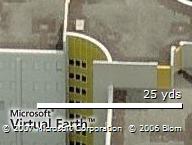Despite half the attendance from 2008, the sessions were of very high  quality and the size of crowd really facilitated an intimate setting to network, eat more than one meal with old and new friends and to have serious conversations about process improvement and the direction of SEI and its Partner network.
quality and the size of crowd really facilitated an intimate setting to network, eat more than one meal with old and new friends and to have serious conversations about process improvement and the direction of SEI and its Partner network.
While it's not an entirely fresh thought, it really hit home for me the extent to which conferences -- and other concentrated spans of time, in general -- have the ability to shake loose new ideas. This conference, sometimes (I admit) unlike other events, I really spent an enormous amount of time and energy reflecting on all-things-process including my own work and company, collaborations, CMMI and other SEI products, and the SEI itself at a strategic level.
It's clear that when you spend that much time on learning, studying and inspection of ideas, the constant barrage of collisions and connections, that all sorts of (typically good) things can come of it. Really, I suspect that these not-so-obvious benefits all-too-often go under-appreciated, and under-utilized as secondary and tertiary returns of getting the most from attending conferences and of sending people to conferences. For my time (and money), these events have the potential to be far more value than mere training and seminars. And, this year's, SEPG-Europe really made me appreciate that.
 The only event on Monday was a workshop on CMMI for Services which included several spirited discussions about model content and applications. An idea-generating session was conducted for how to address qualifications, continuing education, and related credentialing, for qualifying Partners to teach a new training class I'm helping develop in my role as an SEI Visiting Scientist. This discussion warmed up to even higher heart rates. (In a good way.)
The only event on Monday was a workshop on CMMI for Services which included several spirited discussions about model content and applications. An idea-generating session was conducted for how to address qualifications, continuing education, and related credentialing, for qualifying Partners to teach a new training class I'm helping develop in my role as an SEI Visiting Scientist. This discussion warmed up to even higher heart rates. (In a good way.)
Tuesday was the official tutorials day. My CMMI Crash Course could have gone better -- I was dreadfully under the weather from something I ate the night before. I also had it confirmed for me that the European crowd of novices is very different on many levels than American, British and other cultures. I couldn't get people to participate even with (mock) threats and jokes. They simply wouldn't open up. While they would ask questions at times, if I asked a question, they'd wait for me to answer it -- even when prompted them to answer. It came across as though one Danish student had more courage and better answers than the room full of working professionals.
While having the best of intentions to attend afternoon tutorials, I found myself back in bed, skipping lunch and dinner and only emerging once or twice to grab something to drink to stave off dehydration.
The exhibit area opened Tuesday evening, and I showed up with my shirt hanging out, no jacket or socks and looking very much like someone dragged me outside in the rain, hastily dried me off, then stuffed me into well-worn clothes. But, by the evening I was feeling better. Good enough to go down to the adjacent mall to buy 2 bottles of PowerAde. Once of which didn't even survive to see me emerge back out from the mall.
Wednesday, Thursday and Friday were the main conference days. Each one filled with excellent content. (You can download highlights here.) A former client of mine, Kevin Williams started my Wednesday day off with superb content on his (former) company's CMMI journey complete with metrics, examples, and lessons learned. It was a genuinely rich and rewarding example for how small and agile organizations can stay agile, use CMMI to benefit their work and get a desired rating. Kevin reported that despite having left the company and not having been replaced, the processes put in place under his leadership are still in use.
His session would have been better attended (by more people who really needed the information) had it not been for a slight oversight that left the word "Agile" out of his presentation and abstract. As a result, Kevin's 40-minute slot was opposite the start of a half-day tutorial on agile and CMMI from Tim Kasse who really put agile and CMMI under the engineering microscope -- at least while I sat in on the 2nd half of it, so I assume the earlier half was as hard-hitting.
It was hard to tear myself away from the excellent networkin g to get back into sessions throughout the week. Then, once I got back inside, there were other obligations keeping me from staying. For example, to go "play expert" for an "Ask the Experts" break-out, I had to bail out half way through Michael West's insightful work and thoughtful mini-tutorial (complete with hands-on exercises) on process design and communication.
g to get back into sessions throughout the week. Then, once I got back inside, there were other obligations keeping me from staying. For example, to go "play expert" for an "Ask the Experts" break-out, I had to bail out half way through Michael West's insightful work and thoughtful mini-tutorial (complete with hands-on exercises) on process design and communication.
The first keynote speakers started Thursday, but afterwards, the highlight of my Thursday sessions was John Hamilton's talk on complex process concepts for absolute beginners. He was highly energetic, entertaining, and very crammed full of excellent advice. I'm "borrowing" several turns of phrase from him -- which is only fair considering he borrowed a number of ideas (and words) from me. Fair trade. (Be flattered, John, I am!) ((John actually asked me about his use of the ideas at his company's recent conference -- where I also spoke.)) I believe it's from John that I tweeted about where the real improvement begins.
Friday. Ah, Friday. The way Friday got started was surely a sign of good tidings. Tony Devlin's keynote was simply inspiring. My tweets (also) from it don't even tell the half of it. Talk about true maturity. Do they *get* this stuff or what?! I can't even bring myself to write about it out of fear of not having time to sleep tonight once I start. I expressed my thanks afterwards and expressed a request for learning from them and extended an open offer to answer questions from my experience in return. He graciously provided me with his email address and said he'd bare all. Then to have had lunch with him was a real treat. I was already eating with 2 SEI personnel (including Mike Philips the program manager for CMMI), and with one open space, Tony asked to join in. After making a fool of myself over light banter -- in which I forgot an actor's name, thereby forgetting his nationality, and only remembering that he portrayed an Irishman in a movie, causing me to think he was Irish, only to be admonished for confusing Irishmen with Scots when someone recalled the actor for me -- we got back to discussing his experience and solidified our intent to exchange information.
Friday was no where nearly done. A session on multi-model collaboration by Kobi Vider-Picker was incredibly well-researched and his audience was full and attentive. He basically laid-out how well the CMMI suite can handle dozens of standards, guides, regulations, etc. I understand he doesn't need to sleep or eat much. It must be how he finds the time between all his work to do such thorough research. The next session was by Malte Foegen, the tweet from that session set off a chain-reaction of re-tweets. Probably my longest ever.
Lastly, my mini-tutorial based on the SEI Technical Note probably had about a third of the entire attendee roster. Of course, by 4pm on Friday, nearly the entire roster had already started out for the airport. By this point, people were more open to volunteering discussion. Nonetheless, I was struck by how deeply ingrained certain ideas about CMMI (and Agile) have been etched. Despite months of promoting the subject since the publication (years prior to that online); despite the availability of the Crash Course, and other sessions from other events, despite all the presentations throughout this and other SEPG events, and for many, having sat through the Crash Course just days before . . . some misperceptions about CMMI and Agile (such as how certain practices "must" be done, or what constitutes "evidence", or that process definition is process "restriction") just are almost too hard to give up.
There is work ahead still.
I'm on it.
Labels: Agile+CMMI, CMMI for Services, Crash Course, Paradigms, Process, SEI, SEI Partner, SEPG, SEPG Conference, SEPG Europe, Twitter


 The only event on Monday was a workshop on
The only event on Monday was a workshop on  g to get back into sessions throughout the week. Then, once I got back inside, there were other obligations keeping me from staying. For example, to go "play expert" for an "Ask the Experts" break-out, I had to bail out half way through
g to get back into sessions throughout the week. Then, once I got back inside, there were other obligations keeping me from staying. For example, to go "play expert" for an "Ask the Experts" break-out, I had to bail out half way through 


-200.jpg)
